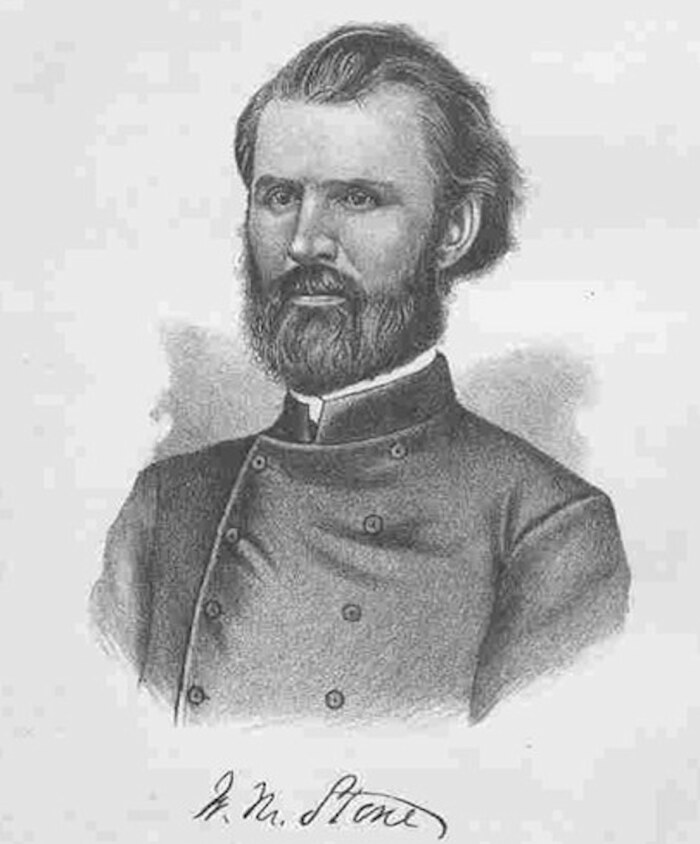This column by Daniel G. Clark about Alexander Clark (1826-1891) first appeared in the Muscatine Journal.
At the 1865 Republican state convention it was Henry O’Connor of Muscatine who nominated Gov. William M. Stone for re-election. Next came the vote of acclamation moved by General Marcellus Crocker, the ailing former commander of the Iowa Brigade.
Iowa’s two-term sixth governor was a popular war veteran and supporter of Lincoln. Until recently I’d given little notice to his part in the equal-rights cause.
Muscatine Journal editorial, June 16, 1865: “It is inconsistent for us to recommend negro suffrage at the South while we shut our ballot boxes against it at the north. We understand that the discussion on this question in the convention was quite animated.”
In campaign speeches later that year, Stone “elaborated, if a bit vaguely, on the contributions of Iowa’s own black regiment, and folksily emphasized how those of its members credited to Iowa’s wartime manpower quota had exempted over two thousand white Iowans from the 1864 draft.” (Historian Robert Dykstra)
“His majority in 1863 was nearly 30,000 and in 1865 about 16,500. His diminished vote in 1865 was due to the fact that he was very strongly committed in favor of negro suffrage.” (Portrait and Biographical Album, Muscatine County, Iowa, 1889.)
The Journal published Stone’s 1866 inaugural address to the legislature, in which he forcefully endorsed the Republican program of reconstruction. Enfranchising Black citizens would enable them to defend their freedom, he said, with “loyal ballots, more formidable to treason than bayonets” in “yet unquiet regions of the South.”
He admonished Iowa to do its part without hypocrisy: “We cannot ask others to adopt this stern principle of impartial justice, if we reject it in our own State. Before we assert that the freedmen of the South should be invested with equality of political rights, let us chasten ourselves, placate our own animosity, and thus practically illustrate the sincerity of the convictions we profess to cherish.”
The governor described increasing tolerance in the state.
“We have stricken from our statutes the infamous laws enacted in our early history, which denied the free negro, or the hunted fugitive the right to tread the free soil of Iowa…. Our present just laws reflect the liberal and humane sentiments of the people. We acknowledge that black men have some rights which are entitled to respect.”
He answered the call for voting rights from the recent convention of Black veterans at Davenport.
“In the darkest hour of the late struggle for the Union, seven hundred of these black citizens stepped forward to fill the quota of Iowa under the President’s call for troops. No class of people contributed so many soldiers in proportion to their numbers. The regiment thus formed, proud of the noble State whose name was borne upon their flag, served faithfully and fought bravely.”
In proportion to their numbers.
“Receiving the highest commendations for their good discipline and valor, they were honorably discharged at the close of the war, and are now among us. Their flag, torn by the storms of battle, has been received from their hands and deposited among the cherished mementoes of the war.”
The flag sewn by women of Muscatine and Keokuk and presented to the 1st Iowa African regiment by Alexander Clark.
“Many of them have families, own property, and have long been among our industrious and quiet inhabitants. Have we that degree of moral courage which will enable us to recognize the services of these black veterans, and do them justice? Anticipating your friendly consideration, they have forwarded a memorial to your honorable body, asking that you take the necessary steps to secure them the right of suffrage.”
The governor called for “an amendment to the Constitution for striking out the word ‘white’ from the article on suffrage, in order that, in due time, this much agitated question shall be submitted directly to the people.”
He likened introducing the suffrage amendment to Iowans’ fast response to Lincoln’s call for troops.
“Boldly assuming the van-guard in this great struggle for equal rights, and deliberately choosing our own path, whatever may be the action of surrounding States, our history is bond and security that we shall take no backward step.”
Finally he urged the lawmakers to ratify the amendment to the U.S. Constitution abolishing slavery forever. They did so four days later on January 15, but not in time to be counted in the required two-thirds.
Daily Gate City (Keokuk), January 16, 1866: “Governor Stone closed his address amid loud and prolonged cheering. ‘Mine eyes have seen the glory of the coming Lord’ was the noble piece that followed to the ‘John Brown’ chorus, and again the hall was filled with the swells of stirring melody as the vast crowd took up the ‘Glory, Glory Hallelujah’ and sang it with a vim.”
The 13th Amendment became law upon ratification by Georgia in December 1865. Iowa had not taken the lead yet.
Next time: One senator asked why wait longer
Top image: William Milo Stone (1827-1893) was the sixth Governor of Iowa (1864-68).

